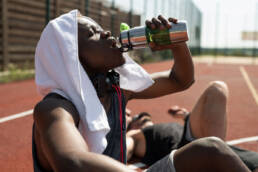Weightlifting and bodybuilding are not just about lifting weights and building muscle; they require a strategic approach to training, recovery, and injury prevention. As a weightlifter or bodybuilder, addressing muscle imbalances, joint stiffness, and overuse injuries is crucial for achieving your goals and maximizing performance. One effective yet often overlooked aspect of this holistic approach is sports massage therapy. In this article, we will explore how sports massage therapy can help weightlifters and bodybuilders recover faster, enhance muscle growth, and improve flexibility, ultimately leading to better performance.
Introduction to Sports Massage Therapy
What Is Sports Massage Therapy?
Sports massage therapy is a specialized form of massage designed to enhance athletic performance and aid in recovery. Unlike traditional massage therapies that focus primarily on relaxation, sports massage is tailored to the specific needs of athletes. It employs various techniques to address the unique challenges and demands of physical activity, making it an essential tool for weightlifters and bodybuilders.
Goals of Sports Massage Therapy
The primary goals of sports massage therapy include:
- Injury Prevention: By addressing muscle imbalances and improving flexibility, sports massage helps reduce the risk of injuries that can occur during training and competition.
- Performance Enhancement: Regular massage can improve circulation, enhance muscle function, and increase range of motion, all of which contribute to better performance in the gym or on stage.
- Faster Recovery: Post-workout massage can alleviate muscle soreness, reduce tension, and promote relaxation, leading to quicker recovery times and less fatigue.
Physiological Effects of Sports Massage
Understanding the physiological effects of sports massage therapy is crucial for recognizing its benefits. Here’s how it impacts the body:
Improved Circulation
Sports massage stimulates blood flow, promoting oxygen and nutrient delivery to the muscles. This enhanced circulation helps flush out metabolic waste products like lactic acid, which can contribute to muscle soreness.
Reduced Muscle Tension
Weightlifting and bodybuilding often lead to muscle tension and tightness, which can restrict movement and lead to injury. Sports massage techniques, such as deep tissue massage and myofascial release, target tight muscles, alleviating tension and promoting relaxation.
Enhanced Flexibility
A significant benefit of sports massage is improved flexibility. By lengthening muscles and fascia, massage can increase range of motion, allowing athletes to perform exercises with better form and less risk of injury.
Alleviation of Muscle Soreness
Post-exercise muscle soreness is common among weightlifters and bodybuilders. Sports massage can help alleviate this discomfort by promoting muscle relaxation and reducing inflammation.
Boosting Overall Well-Being
In addition to physical benefits, sports massage therapy can enhance psychological well-being. The relaxation induced by massage can lead to reduced stress levels and improved mood, contributing to overall performance and enjoyment of training.
Benefits for Weightlifters and Bodybuilders
Addressing Muscle Imbalances
Weightlifting and bodybuilding often lead to muscle imbalances due to repetitive movements and overtraining of certain muscle groups. Sports massage can help identify and address these imbalances by targeting specific muscles that are overactive or underactive. For example, tight hip flexors can lead to poor squat mechanics, while weak glutes may hinder deadlift performance. Regular massage can help restore balance and function.
Combating Joint Stiffness
Joint stiffness is a common issue for weightlifters and bodybuilders, particularly in the shoulders, hips, and knees. Sports massage can enhance joint mobility by working on the surrounding muscles and connective tissues. This increased mobility allows for better lifting mechanics and reduces the risk of joint injuries.
Preventing Overuse Injuries
Overuse injuries, such as tendonitis or bursitis, can occur when athletes push their bodies beyond their limits without adequate recovery. Sports massage helps manage these risks by promoting recovery and reducing inflammation. Techniques like deep tissue massage can break down adhesions and scar tissue, aiding in the healing process.
Aiding Muscle Recovery
The recovery process is crucial for weightlifters and bodybuilders. Sports massage aids muscle recovery by increasing blood flow and reducing muscle soreness. By incorporating massage therapy into their routine, athletes can train harder and more frequently while minimizing the risk of burnout and fatigue.
Enhancing Muscle Growth
Proper recovery is essential for muscle growth. Sports massage not only helps in recovery but also improves muscle function. When muscles are relaxed and free from tension, they can work more efficiently, leading to better results in the gym.
Improving Flexibility
Flexibility is a key component of overall athletic performance. Sports massage can improve flexibility by lengthening muscles and breaking down adhesions. This increased flexibility allows weightlifters to achieve better positions during lifts, ultimately leading to improved performance.
Case Studies: Real-Life Examples
Numerous athletes have experienced the benefits of sports massage therapy firsthand. For instance, a local bodybuilder preparing for a competition may find that regular massage sessions help alleviate tightness in their shoulders and back, allowing for improved bench press performance. Another weightlifter may report faster recovery times and less muscle soreness after incorporating sports massage into their post-workout routine. These success stories illustrate how massage therapy can address the unique needs and challenges faced by weightlifters and bodybuilders.
Injury Prevention and Rehabilitation
Preventing Common Sports-Related Injuries
Sports massage therapy is a proactive approach to injury prevention. By addressing muscle imbalances and improving flexibility, it helps create a balanced and resilient musculoskeletal system. Regular massage can identify potential issues before they lead to injury, allowing athletes to adjust their training accordingly.
Accelerating Rehabilitation
In the event of an injury, sports massage therapy can play a significant role in the rehabilitation process. By improving blood flow and promoting tissue healing, massage can help athletes recover more quickly from injuries, surgeries, or overuse conditions. Collaborating with healthcare professionals ensures a comprehensive approach to recovery, integrating massage therapy with physical therapy and other modalities.
Enhancing Performance and Recovery
Optimizing Athletic Performance
Sports massage therapy can enhance athletic performance by reducing muscle fatigue and improving recovery time. By incorporating massage into pre-event preparation, athletes can enter competitions feeling more relaxed and ready to perform at their best.
Post-Event Recovery
After intense workouts or competitions, massage therapy can help facilitate recovery. Techniques such as lymphatic drainage massage can reduce swelling and promote the removal of metabolic waste, allowing athletes to recover faster and return to training sooner.
Tips for Incorporating Massage Therapy
To maximize the benefits of sports massage therapy, consider the following tips:
- Schedule Regular Sessions: Incorporate sports massage into your training schedule, ideally once a week or bi-weekly.
- Communicate with Your Therapist: Share your training routine, any areas of concern, and specific goals with your massage therapist. This information helps tailor the session to your unique needs.
- Combine with Other Recovery Modalities: Use massage therapy in conjunction with other recovery techniques, such as stretching, foam rolling, and proper nutrition.
Choosing the Right Massage Techniques
Overview of Common Massage Techniques
Several massage techniques are commonly used in sports massage therapy:
- Swedish Massage: A gentle technique that promotes relaxation and overall well-being.
- Deep Tissue Massage: Targets deeper layers of muscle and connective tissue, ideal for addressing chronic tension and muscle soreness.
- Myofascial Release: Focuses on releasing tension in the fascia, the connective tissue surrounding muscles.
- Trigger Point Therapy: Targets specific knots or trigger points in muscles to relieve pain and improve function.
Selecting the Appropriate Techniques
Choosing the right massage techniques depends on individual athlete needs, preferences, and training goals. A knowledgeable sports massage therapist can assess your condition and recommend the most suitable techniques for optimal results.
Integration with Training and Wellness Programs
Importance of Integration
Integrating sports massage therapy into a comprehensive training and wellness program is essential for maximizing its benefits. By viewing massage as an integral part of your training routine, you can ensure better overall performance and recovery.
Establishing a Regular Schedule
To reap the full benefits of sports massage, establish a regular massage schedule. Collaborate with your massage therapist to determine the frequency of sessions based on your training intensity and individual needs.
Collaboration with Healthcare Professionals
Working with healthcare professionals, such as physical therapists and nutritionists, can enhance the effectiveness of sports massage therapy. A multidisciplinary approach ensures that all aspects of your health and performance are addressed.
Incorporating Self-Care Practices
In addition to regular massage sessions, incorporating self-care practices can further optimize recovery and performance. Techniques such as foam rolling, stretching, and proper hydration contribute to overall well-being.
The Psychological Benefits of Sports Massage Therapy
While sports massage therapy is renowned for its physical benefits, its positive effects on mental health and performance are equally significant. Here’s how it contributes to athletes’ psychological well-being:
Stress Reduction and Relaxation
Massage therapy promotes relaxation by reducing stress levels. Athletes often experience pressure to perform, and massage can provide a calming effect, helping them manage stress and anxiety.
Anxiety and Mood Regulation
Regular massage therapy can help regulate mood and reduce symptoms of anxiety. The relaxation induced by massage can lead to improved mental clarity, focus, and overall emotional well-being.
Pain Management and Coping Skills
Sports massage can aid in pain management, providing athletes with coping strategies for dealing with discomfort and injury. By promoting relaxation and reducing pain, massage therapy can help athletes maintain a positive mindset during challenging training periods.
Confidence and Self-Efficacy
Feeling good physically can enhance an athlete’s confidence. Sports massage therapy can contribute to improved body awareness and physical performance, leading to increased self-efficacy and confidence in their abilities.
Mental Focus and Cognitive Function
Massage therapy can enhance mental focus and cognitive function, allowing athletes to concentrate better during training and competition. This heightened focus can lead to improved performance and decision-making on the field or in the gym.
Conclusion: Unlock Your Athletic Potential with Sports Massage Therapy
For weightlifters and bodybuilders, sports massage therapy is not just a luxury; it’s a vital component of a successful training regimen. By addressing muscle imbalances, joint stiffness, and overuse injuries, massage therapy helps athletes recover faster, enhance muscle growth, and improve flexibility. Integrating sports massage into a comprehensive training program can unlock your full athletic potential and pave the way for success in the gym.
At Denver Sports Massage, we specialize in providing tailored sports massage therapy for weightlifters, bodybuilders, and all athletes seeking to optimize their performance and well-being. By understanding the unique needs of each athlete, we ensure a personalized approach that promotes recovery, enhances performance, and fosters overall health. Don’t wait to experience the transformative benefits of sports massage therapy—schedule your appointment today and take the first step toward achieving your fitness goals!

With unique treatment plans tailored specifically to each individual, our goal is to offer a comprehensive approach to healing and reducing pain. We pride ourselves on taking a holistic approach to massage therapy for pain and are committed to providing the highest quality care. If you’re looking for a massage therapist in Denver to help with pain, schedule an appointment today!
Like this article? Spread the word!
Related Posts
April 15, 2025
Weekend Warriors, Beware: How to Bounce Back From Spring Sports Injuries
Weekend warriors, beware—spring injuries can sneak up fast. Learn how massage therapy…
March 15, 2025
Ski & Snow Sports: Addressing Muscle Tightness and Fatigue, Injury Prevention, and the Benefits of Massage Therapy
Relieve muscle tightness and fatigue from skiing with massage therapy. Learn injury…
February 15, 2025
The Ultimate Recovery Plan for Skiers and Snowboarders: Avoid Injuries This Winter
Stay injury-free this ski season with a tailored recovery plan! Discover how Denver…




